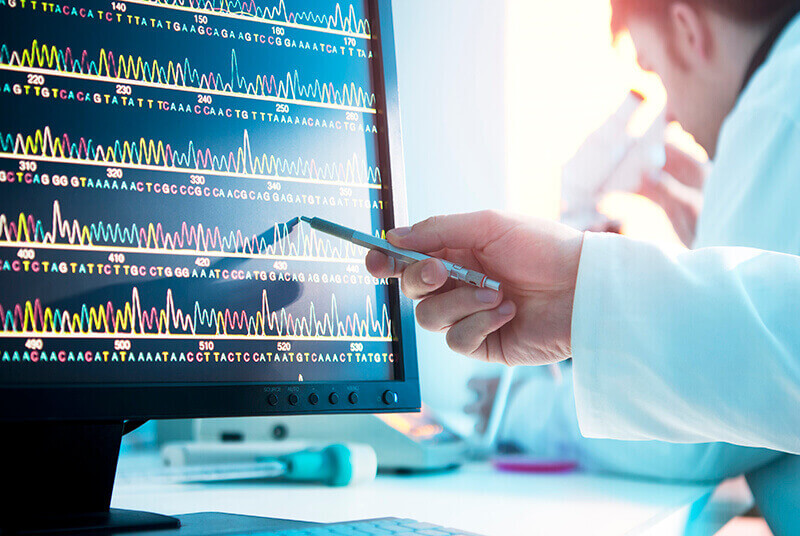
Leveraging Technology at MNG
MNG Laboratories is dedicated to leveraging the latest sequencing technology to remain a leader in neurogenetic diagnostics. This cutting-edge technology is utilized in the sequencing of numerous tests in our growing portfolio.
Next-Generation Sequencing
Massively parallel sequencing, more commonly known as Next-Generation Sequencing (NGS), is a technique that allows for the fast, ultra-high throughput, and scalable sequencing of nucleic acids in biological systems. MNG Laboratories’ sequencing platform utilizes short-read sequencing by synthesis (SBS) chemistry to rapidly and accurately sequence DNA and RNA. Significant advancements in sequencing equipment has greatly expanded the opportunity to provide a fast and accurate diagnosis for patients with genetic conditions.
Capillary Electrophoresis
Capillary Electrophoresis (CE) is a technique that uses an electric field to separate molecules of DNA of different sizes. This method is deployed for Sanger Sequencing, repeat expansion sizing, and deletion/duplication analysis using Multiplex Ligation-dependent Probe Amplification (MLPA).
Sanger Sequencing
is a method of DNA sequencing that uses the selective incorporation of chain-terminating dideoxynucleotides from PCR. First developed by Frederick Sanger in 1977, this widely used sequencing technology has generally been replaced by NGS for large-scale analysis, but it’s still commonly used to variant confirmation.
Repeat expansion analysis
involves the size investigation for disease-causing nucleotide repeats in the genome. These disorders are particularly common among neurological disorders, e.g. Spinocerebellar Ataxias, Friedreich Ataxia, and Huntington’s Disease. Repeat expansion detection using capillary electrophoresis can detect and size repeats up to 500 base-pairs in length.
MLPA®
is a multiplexed PCR method used to detect abnormal copy numbers for genomic (DNA or RNA) sequences. This cost-effective technology can be used as a first-line detection for pathogenic deletions/duplications or as a method for confirming pathogenic copy number variants (CNV) found via NGS.
Sanger Sequencing
- Pathogenic Single Nucleotide Variant Confirmation
- Single Gene Sequencing
Repeat Expansions
- Spinocerebellar Ataxias
- Myotonic Dystrophy
- Huntington’s Disease
- Friedreich Ataxia
- Amyotrophic Lateral Sclerosis (ALS)
MLPA
- SMN1/SMN2 Copy Number Changes
- Other Single Gene Del/Dup
- CNV Confirmatory Testing
Neurochemistry
Dr. Keith Hyland, PhD, runs the Neurochemistry/Metabolic department at MNG Laboratories and is a globally recognized expert in the field of inherited metabolic disease and test method development. Dr. Hyland is well known for his expertise in neurotransmitter disorders and has twice received the annual award of the Society for the Study of Inborn Errors of Metabolism (SSIEM). He has over 150 peer reviewed publications, book chapters, and invited reviews, and has held multiple research grants. Many inherited disorders that affect neurotransmitter metabolism do not lead to biomarker accumulation in peripheral fluids. The Neurochemistry/Metabolic department at MNG therefore provides a comprehensive menu of tests that examine diagnostic analytes in cerebrospinal fluid (CSF). These tests examine the pathways involving serotonin, the catecholamines, gamma aminobutyric acid (GABA), pyridoxine, folic acid, amino acids, and purines. In addition, we analyze neopterin as a marker for immune system stimulation and have biomarkers that indicate the presence of alpha aminoadipic semialdehyde dehydrogenase deficiency, the disorder that leads to pyridoxine responsive seizures.

